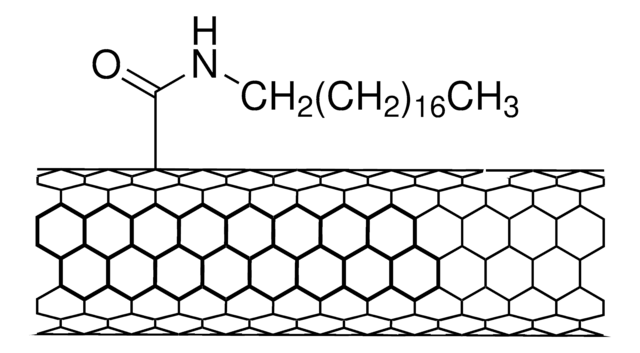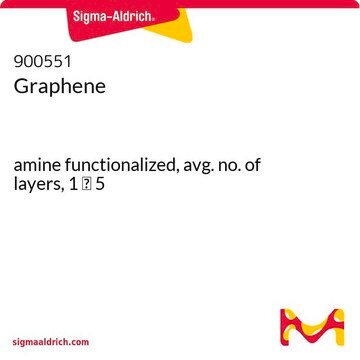685380
Carbon nanotube, single-walled
amide functionalized, >90% carbon basis, D × L4-6 nm × 0.7-1.0 μm , bundle dimensions
Synonym(s):
SWNT, amide functionalized
About This Item
Recommended Products
product name
Carbon nanotube, single-walled, amide functionalized, >90% carbon basis, D × L 4-6 nm × 0.7-1.0 μm , bundle dimensions
Assay
>90% carbon basis
form
powder
extent of labeling
per 4 atom % (amide groups)
D × L
4-6 nm × 0.7-1.0 μm , bundle dimensions
impurities
5-8% metals
solubility
DMF: 0.5-1.0 mg/mL (with sonication)
acetone: 0.5-1.0 mg/mL (with sonication)
alcohols: 0.5-1.0 mg/mL (with sonication)
functional group
amide
Related Categories
Preparation Note
Signal Word
Warning
Hazard Statements
Precautionary Statements
Hazard Classifications
Eye Irrit. 2 - STOT SE 3
Target Organs
Respiratory system
Storage Class Code
11 - Combustible Solids
WGK
WGK 3
Flash Point(F)
Not applicable
Flash Point(C)
Not applicable
Personal Protective Equipment
Certificates of Analysis (COA)
Search for Certificates of Analysis (COA) by entering the products Lot/Batch Number. Lot and Batch Numbers can be found on a product’s label following the words ‘Lot’ or ‘Batch’.
Already Own This Product?
Find documentation for the products that you have recently purchased in the Document Library.
Customers Also Viewed
Articles
Carbon nanotubes are materials that possess remarkable properties and offer extraordinary possibilities.
Carbon nanotubes (CNTs) have received much attention since their discovery in 1991 by Sumio lijima1 due to their excellent mechanical, electrical, and optical properties.
A nanocomposite is typically defined as a mixture between a host material (e.g., polymer matrix) and nanofillers with at least one dimension of less than 100 nm.
SWCNTs show promise in FETs, solar cells, and photodetectors due to their ultrafast charge transport mobility.
Our team of scientists has experience in all areas of research including Life Science, Material Science, Chemical Synthesis, Chromatography, Analytical and many others.
Contact Technical Service








